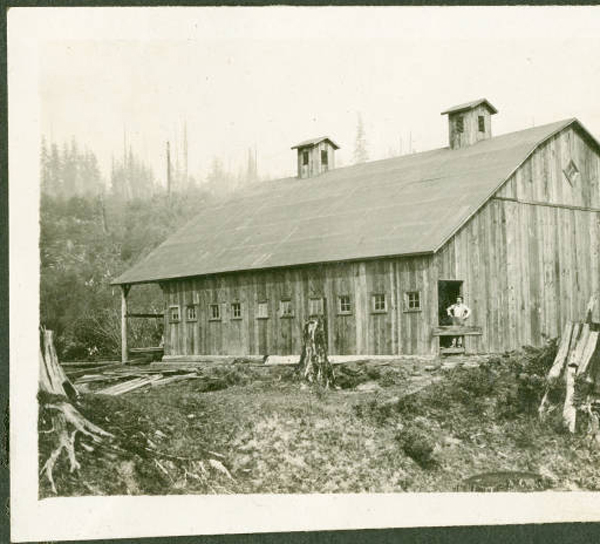New collection showcases life on Whatcom County family farm
The almost-completed Nesset family barn in 1919. (Photo courtesy Washington Rural Heritage)
Thanks in part to a grant from the Washington Rural Heritage program, a great new collection of digitized photos shows viewers what life was like a century ago on a family farm in Whatcom County.
A blog post on our Washington State Library’s webpage tells more:
The Nesset Family Farm Collection tells the story of a Norwegian immigrant homesteaders who settled on the South Fork Nooksack River in 1902, and for decades worked tirelessly to coax a living from the land, raise five children, and run a small dairy. In the meantime, they documented the many pleasures of settler life in the South Fork, including hiking and skiing on Mount Baker, and fishing on the Nooksack River.
The Nesset homestead is no longer a working farm, but the land and many of its historical buildings have been preserved by successive generations of Nessets as well as the Nesset Farm Trust. Today, the farm is considered one of the best remaining examples of an intact agricultural homestead in Western Washington. Many of the original buildings, including the farmhouse and barn, are being renovated as of this writing (2015) and will be open to the public when Whatcom County’s newly established South Fork Park is completed.
The Nesset Family Farm Collection is just one part of the Deming Library’s Mount Baker Foothills Collection—a locally-managed digital initiative which promises to bring together a wealth of unique historical materials and make them freely available online.
Digitization in 2014-2015 was accomplished with a grant award from the Washington State Library, funded by the Library Services and Technology Act (LSTA) through the Institute of Museum and Library Services (IMLS).
The Nesset digital collection comes from the Deming Library, part of the Whatcom County Library System.
You can learn more about the Nesset digital collection here.
Go here to learn more about the Washington Rural Heritage program and see other collections. The program is run by the State Library, a division of the Office of Secretary of State.
